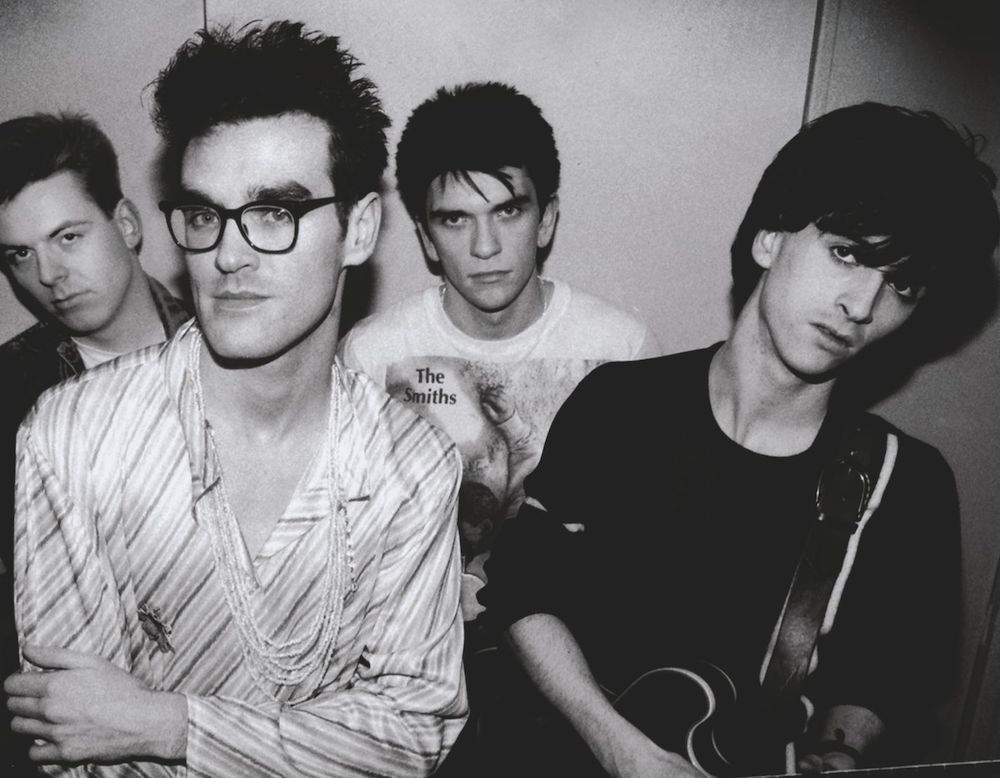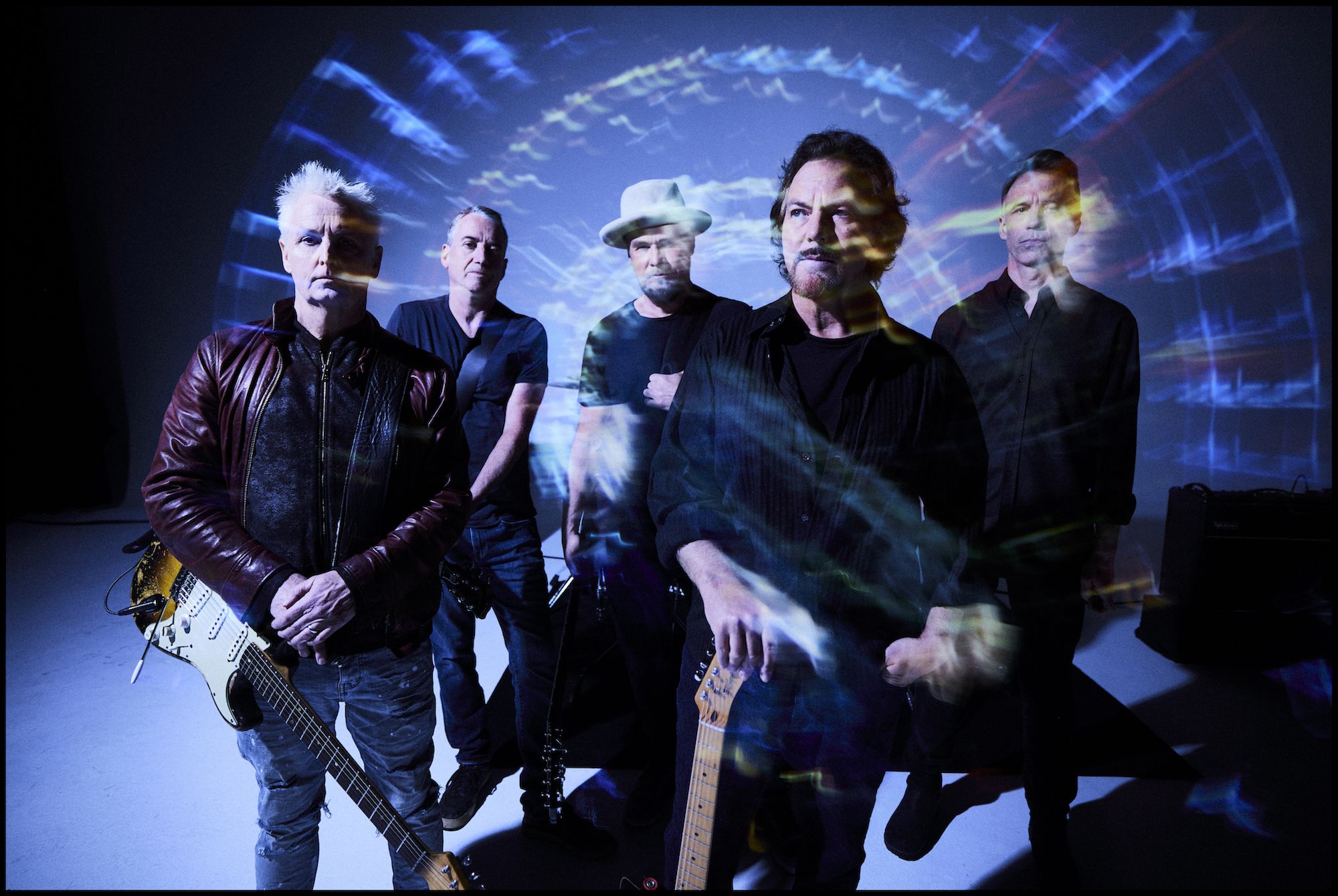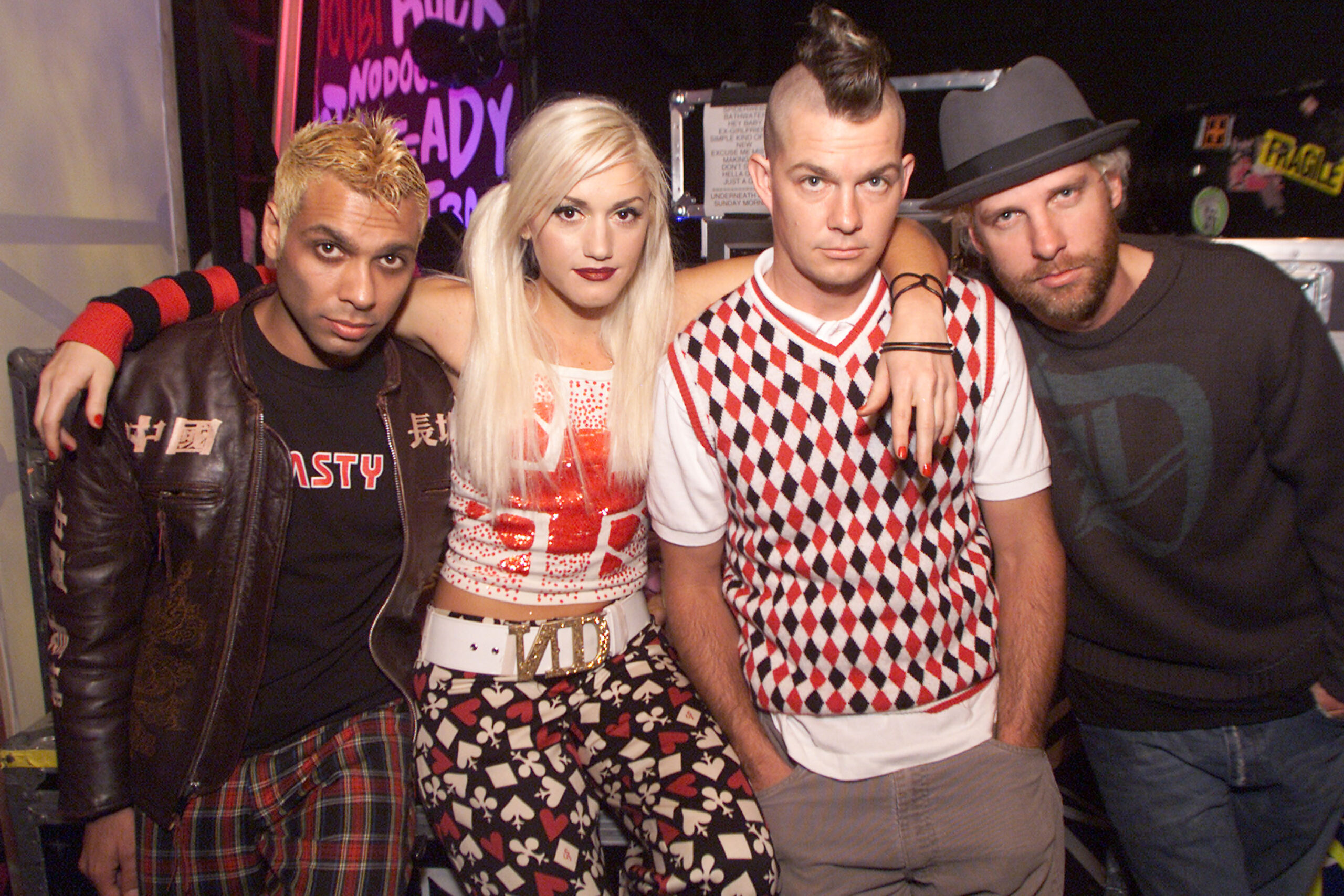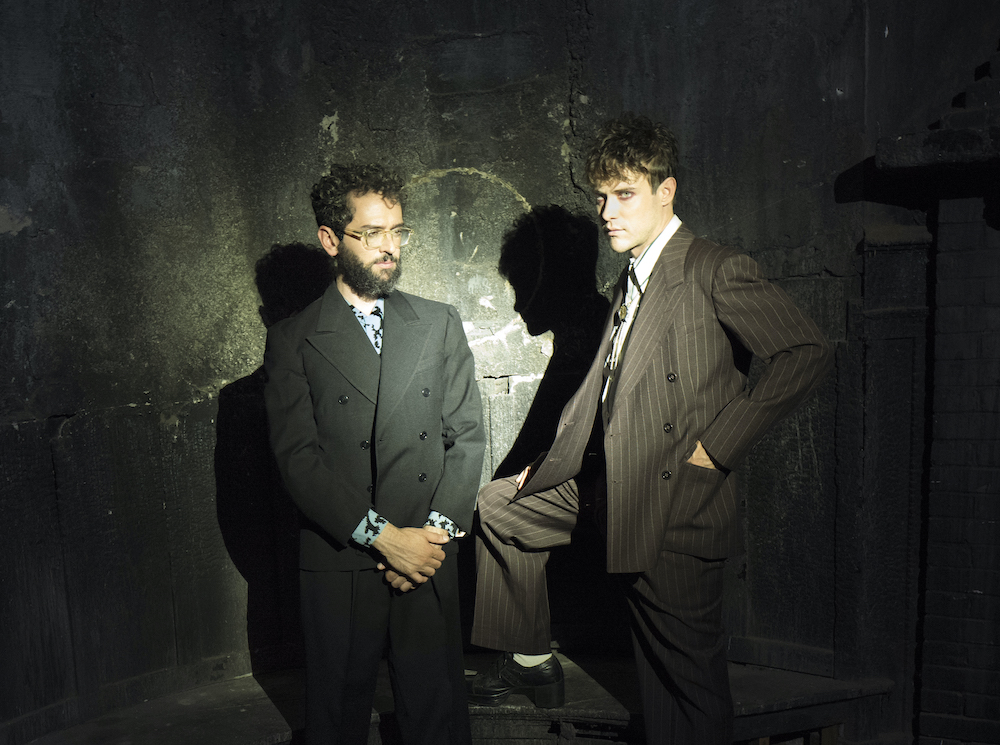Over the course of the last three months, I've seen Damon Albarn perform four times, and a certain quality of his career was boldly underlined: there are great disparities between who knows him, where they know him from, and where they know him from without realizing it. One of the obvious divides is nationality, but the crucial qualifier is age. For a British person in their early twenties, Britpop was ubiquitous as they were growing up -- there's no way you didn't know who Blur was, even if they were already defunct by the time you were in your early teens and perhaps exploring music for the first time. For an American, it's quite different. If you were an indie/alternative fan in '90s America, Blur would've been this exotic safe haven if mainstream alt-rock wasn't your thing, but if you're the same age as those British kids who lived and breathed Britpop, chances are a lot of your friends might not know about Blur but are very, very familiar with the pop hits Gorillaz had through the '00s. Of course, just because you might be familiar with "Feel Good Inc." or "Clint Eastwood" doesn't mean you know Albarn himself -- part of the conceit of Gorillaz, originally, was that they were an invented cartoon band.
I spoke with fans at these shows who knew Albarn as "the guy from Blur, with that great new solo album," but didn't realize he'd also be playing "El Manana" that night. I spoke with fans who knew all of Albarn's work and cheered for a comparative obscurity like the Good, The Bad, & The Queen's "Kingdom Of Doom." And then, when he and his band began one of Gorillaz' hits, they elicited the most fervent crowd reactions of the night. Part of that could be attributed to those songs being much more fun in a live setting than the beautiful but understated Everyday Robots material, but part of it, I would imagine, is that some of these American festival-goers knew Albarn first and foremost from his work with Gorillaz.
Back in the '90s, it would've been hard to imagine Albarn going in the direction of Gorillaz. And now, with Albarn leaving both Blur and Gorillaz in the past for the moment, that direction exposes one of the strangest career arcs in pop music. Blur is one of the bands that defined Britpop and, accordingly, were guitar-based and very, very British. Damon Albarn was a massive popstar. With Gorillaz, on the other hand, Albarn cloaked his popstar identity in projections created by Jamie Hewlett and proceeded to make music based on hip hop beats and synthesizers, drawing on anything he wanted, whether it was gospel or dub or rap. And instead of a disastrous attempt at reinvention, he succeeded wildly. Not only did he achieve a new and different kind of pop status here in the States, garnering a new and different generation of fans, but he also managed to open up his songwriting to previously unforeseen territory. I'm hard-pressed to think of another musician who has the sort of dual success stories as Albarn, or one who does and attained them in such disparate ways.
Because of Gorillaz, Albarn is still relevant. To return to an argument I've made before, the fascinating thing about the divide in Albarn's career is that with Blur, he was at the forefront of one of the last gasps of what some consider a pre-digital monoculture. You know, back when guitar music could still rule the mainstream, back when there were more borders between genres and those who played within them. In Britain, that would've been Britpop, in America, grunge and mainstream alternative. (Some commenters on my profile of Albarn back in April argued that the early '00s retro-rock represented the last universal guitar-based movement, and fair enough -- that's more universal than things are now, but I'd argue the fragmentation was already underway, and it can't be talked about as the same sort of phenomenon that grunge or Britpop were.) The thing about Gorillaz is that it represented the exact opposite. It was a project perfectly designed for the grab-bag mentality of a generation coming up on the internet, iTunes, and a more free-for-all attitude about what to listen to. There's a whole mess of sounds, styles, and voices on each Gorillaz record, and Albarn's ability to collect them into a whole, to consume and hold it all in, is a learned ability of the internet era. It's hard to imagine anyone else in the last, waning generations of rockstars being able to reorient themselves on such a fundamental level as artists, to be able to take the pulse of two entirely different eras and give something back that resonates so strongly for each.
Speaking as one of those Americans who found Albarn through Gorillaz and not Blur, this music was foundational. The self-titled Gorillaz debut was the first album I ever bought, and after later finding out it was "by that guy from that band who did the 'Woo-hoo!' song" (i.e. "Song 2" from 1997's Blur), I found my way back to Britpop and to Blur, who became one of the most important bands in my life. But, perhaps even more importantly, Gorillaz were formative in the sense that I'm also one of those Americans who was learning to listen to music in an era of file-sharing. Their music, curated as it was, could be a sort of roadmap for someone like me, growing up listening to classic rock and grunge in small town Pennsylvania. When I think back on it, I'm pretty sure Gorillaz are one of the main reasons I started listening to rap, or to different kinds of electronic music.
Upon revisiting the Gorillaz catalog, I realized they're very difficult to sum up for an artist with only three full-lengths (unless you count The Fall as a total stand-alone record, but to me it's always been more of an epilogue). To a certain extent, this is a similar issue with Blur: you can focus a list around the pop standouts, the iconic ones, or you can easily find ten exceptional songs from Albarn's sad, dreamy mode of songwriting as well. With Gorillaz, it becomes even murkier due to the panoply of voices and styles that flit in and out, that crash up against one or another or melt together. Perhaps this makes sense, given the significant amount of time the albums span -- the 2000 and 2001 genesis of Gorillaz was a very different pop landscape than that of 2010, the one Plastic Beach entered -- not just in the sense of the sounds Albarn was incorporating, but also that Albarn was now able to attract a lot more mainstream firepower with the Gorillaz moniker. With so many moving pieces jostling together, it's a wonder each Gorillaz record comes together as strongly as it does, and it's a testament to Albarn's flexibility as an artist. He had already mastered the frontman gig, now becoming master at curation. The songs were always his, but it's like he's playing the role of architect with Gorillaz.
So, after much hand-wringing and deliberation and attempting to check biases from various points in my life, here are ten songs that represent the best of what Albarn had to offer with Gorillaz. Unlike with some of the other lists of this sort that I've done, there were two or three other versions that looked almost entirely different. There are a lot of other songs I love by Gorillaz. Let's talk about it in the comments.
10. "Amarillo" (from The Fall, 2011)
"Amarillo" is the best song on The Fall, the album that Albarn composed on an iPad while touring America in support of Plastic Beach. The name refers to the season in which the tour occurred, but the whole thing also has this blurry vibe to it -- much of it is inspired by the long, desolate stretches passing by Albarn's tour bus window as he wove across the country. "Amarillo" has an end-of-the-world vibe about it, its melancholy the particular brand that might crop up when you're standing in the desert in America, looking at a decrepit old motel. Somehow claustrophobic and diffuse at the same time, it's also an entry in the line of gorgeously sad Albarn songs that find refuge in electronic overload; another of these is Blur's "Battle." There's little that Albarn's done in recent years that's anywhere near as lush as the synth layers on "Amarillo." It's one of those songs that sounds great very loud on headphones while you're out walking around someplace. Hiding in that instrumental thickness is one of Albarn's best laconic/tragic deliveries -- the way he sings "Put a little love / Into my lonely soul," coupled with the music surrounding it, is a sleeper candidate amongst the best of Albarn's morose moments. The commitment to sparser arrangements worked well for the storytelling nature of Everyday Robots, but I wouldn't mind a whole album of Albarn getting introspective like this, either.
9. "Plastic Beach" (from Plastic Beach, 2010)
Plastic Beach sort of has two title tracks, the other being "Welcome To The Plastic Beach." "Plastic Beach" arrives much later in the album, amidst the album's frayed, sun-baked second half. Aside from being the title track, it's also something of a sonic centerpiece for the record. All the fried synthetic sounds of Plastic Beach, all the themes of detritus, are audible in the song "Plastic Beach." On one hand, it's a blurry and disorienting experience -- it's got the same dreamily oscillating synths Albarn made use of on "Empire Ants" (more on which is below), but also one of the album's most steadily funky rhythms. Throughout, vocals are warped or pitch-corrected into inhuman oblivion. It has the sound of a pop song that was left out in the sun too long and wound up malformed and melted but still infectious. Considering the fake pop band conceit of Gorillaz and the various images of destruction and apocalypse that are littered through their videos, "Plastic Beach" winds up being rather representative not only of this specific album but of Gorillaz as a project -- the song itself is stray elements of pop detritus, mutated together to form something different.
8. "El Manana" (from Demon Days, 2005)
As mentioned above, there's a whole subgenre of sad pop songs within Albarn's canon. But where the pop songs of Blur or Gorillaz sound nothing alike, it's material like this that could be culled from all periods of his career, and sure, they'd bear a little bit of their respective projects' specific aesthetic, but they would also be the connective tissue through much of Albarn's twists and turns as an artist. Take "El Manana" from Demon Days, which makes a lot of sense alongside "Kingdom Of Doom" or "Herculean" off The Good, The Bad, & The Queen, or next to Everyday Robots, or beside something off of Blur's last two or three albums. Though it wasn't a significant hit like "Feel Good Inc." or "D.A.R.E.," I seem to remember seeing the video for this song constantly on whichever music channel I was still watching back in '05/'06. This is one of those Gorillaz songs that has one identity amongst its album and accompanied by its stylized video, but can stand alone as a personal and separate song. (Which is why it makes sense that it is one of the Gorillaz songs Albarn has incorporated into his recent solo sets.) Even from a career littered with haunting and heartbroken music, "El Manana" is a classic from Albarn's more downbeat side.
7. "Empire Ants" (from Plastic Beach, 2010)
You know how every now and then you're listening to a song that has some severe shift or emphatic rise, and you reach to turn up the volume because it feels like everything needs to be forcibly made just a bit bigger than the recording allows? What I've always loved about "Empire Ants" is that the necessary volume jump is built into the song. As Albarn's mellow intro begins to cede to that synth-bass, you know something else entirely is about to crash in, and when all those synths do begin cascading, the song means it. To be honest, the first half of this song doesn't floor me -- it feels like an interlude, and functional, in the sense that the second half of "Empire Ants" has all its power because of what it rises out from. Once "Empire Ants" gets going, though, it's one of the most gorgeous and infectious pieces of music Albarn's ever recorded. And, notably, it's a different sort of catharsis than he has used elsewhere in his career. Little Dragon's voice and the dreamy synth progressions all echo out from some other place, and that's why that volume spike is so crucial to this song. The pivot at the center of "Empire Ants" takes you to a completely different headspace. And, at least for me, the production moves here are so adept that it still manages to do that to me every time I hear the song, even when I'm listening to those first two minutes specifically waiting for the transition. It's biological.
6. "Slow Country" (from Gorillaz, 2001)
"Slow Country" has always been one of my favorite Gorillaz songs. I suppose there are parts of it you could call dated, or lesser-realized than the Gorillaz work that would follow, but out of the material from Gorillaz, it's one of the songs that's aged the best, still feeling unique all these years later. For not entirely logical reasons, there are sounds here that remind me of one of those old Super Mario Bros. side-scrollers, of a particular piece of old videogame music lodged in the back of my memory. And I think that's why this song lives on -- it sounds like what you thought the future would sound like when you were a child. The nostalgia it evokes for me, and a prime laconic Albarn delivery, means I've never been able to pin down whether "Slow Country" is a sad or happy song, despite its catchiness and tempo. (This was, after all, from Albarn's heroin period.) At any rate, Albarn's been incorporating it into solo sets recently (a very welcome addition), and been playing it very much as one of the big pop moments in the set. He's a master of that art form, the song that could be happy or sad depending on what you bring to it.
5. "On Melancholy Hill" (from Plastic Beach, 2010)
Speaking of Albarn songs where you can't tell if they're supposed to be happy or sad, the king of them all might be "On Melancholy Hill." I mean, yeah, it says "melancholy" in the title, and has Albarn singing in his sad voice, but that lead synth line is so ear-worm-y, those background "ahh-ahhs" so warm and comforting, that this one's always come off as being cheekily mistitled. Maybe "On Reverie Hill" would've sounded too confusing? "On Melancholy Hill" occupied a similar position on Plastic Beach as "El Manana" did on Demon Days, the more midtempo, restrained pop song to the hip hop verses or dance beats or funk of other singles like "D.A.R.E." or "Stylo." Though Albarn used synthesizers on Gorillaz records all the time, and especially prominently on Plastic Beach, "On Melancholy Hill" is a bit of an outlier. Albarn has rarely committed so fully to a synth-pop aesthetic -- this is New Wave for daytime hours. It's another mode of writing that I'd be interested in hearing him explore more down the line.
4. "Feel Good Inc." (from Demon Days, 2005)
"Feel Good Inc." might be the perfect example of everything that could've/should've gone wrong with Gorillaz instead working out really, really well. Even more so than "Clint Eastwood," "Feel Good Inc." takes an introspective, very classic-Albarn chorus with acoustic guitar and all, and crams it in between squiggly synths, prominent beats, rap verses from De La Soul, and one of the most memorable basslines of the last ten years. There are several things here that shouldn't make any sense flowing into one another, and instead it became Gorillaz' biggest single overall, and the one that got chosen for an Apple commercial. And yet even with all that exposure, it still sounds great -- it might not hit on the same emotional level as Albarn's more confessional songwriting, but it's one of his best when it comes to pure, visceral enjoyment, and it still gets a huge response as soon as that indelible bassline echoes out from the stage. It's one of the most iconic Gorillaz songs. And in terms of sheer pop songcraft and an ability to work within new idioms, it's one of Albarn's finest achievements.
3. "Tomorrow Comes Today" (from Gorillaz, 2001)
That bit I said about "El Manana" being one of the connective songs of Albarn's career also applies to "Tomorrow Comes Today," but two- or three-fold. This is probably one of the best and most important songs Albarn's ever written in relation to his career, in the sense that it marks the transition. "Tomorrow Comes Today" began life as a Blur demo called "I Got Law." It was the namesake for the lead Gorillaz EP in 2000. There's latter-day Blur material that doesn't sound wildly different from this, but it was also, of course, the template for the territory Albarn would more fully explore with Gorillaz. It's also trippy, and depressive, and pretty all at the same time. The weird thing about it is that it's so easy to contextualize like that, but it's also so easy to hear it entirely removed from its context. Yeah, the trip-hop beat sounds very of its era, and yeah it was where Blur bled into Gorillaz (and, with Think Tank, where Gorillaz would bleed back into Blur). But if you were going to compile a greatest hits of Albarn's whole career, this would be a crucial entry that stood on its own as a great, sad single. It functions as a hinge point, but is one of Albarn's most perfect songs.
2. "Don't Get Lost In Heaven"/"Demon Days" (from Demon Days, 2005)
Yes, technically, "Don't Get Lost In Heaven" and "Demon Days" are two separate tracks on Demon Days. But these songs are inextricably linked -- one cannot function without the other in the same way that the two halves of "Empire Ants" can't stand alone. "Don't Get Lost In Heaven" bleeds right into "Demon Days" on the record, and Albarn used to close with them when touring Plastic Beach. So, for the purposes of this article, I'm looking at it as a singular piece. And, looking at it as such, it's another in a lineage of Albarn's penchant for incredibly strong album closers. Of all the alternate universe, otherworldly sounds Albarn's crafted in one form or another in his career, this pairing is at once more customary and totally unreal. There are the obvious gospel elements in both, but they're tied together by the beginning of "Demon Days," with Albarn's voice buried and ghostly amongst the distortion and strings. Collectively, it sounds like space age soul. "Don't Get Lost In Heaven" and "Demon Days" are the much deserved and much earned light at the end of all the gnarled, darkened elements of Demon Days. They remain amongst the most rewarding catharses Albarn has yet written.
1. "Clint Eastwood" (iTunes Session) (from iTunes Session, 2010)
For me, "Clint Eastwood" started it all. Gorillaz was the first album I bought because I heard this song. A friend played me the video, and without any real understanding of pop history or whatever this cartoon was in front of me, I simply thought -- what the hell is this? It felt like the first thing of our own, the first thing we'd discovered, instead of having Zeppelin or whomever passed down from older friends or relatives. There were a few years there where I didn't return to Gorillaz all that much, the period of time where I was deep into grunge and classic rock. And then after I'd been listening to Gorillaz for a while again, and after I'd discovered Blur -- in 2010 Gorillaz did an iTunes session to promote Plastic Beach, and it had this absolute behemoth of a version of "Clint Eastwood," and I found myself saying "What the hell is this?" all over again. The single itself is a classic, sure, but I'd argue this song comes into a newer, fuller, entirely more badass version in its live incarnation. That bass, the clanging piano, the swaggering stutter of the beat -- everything just sounds like a beast live. I saw Gorillaz play it at Madison Square Garden back in 2010, but Bashy and Kano came out and did the verses and sort of made a mess of it. I was then lucky enough to see Albarn perform it with Del Tha Funky Homosapien for the first time ever this past March at SXSW. This version from the iTunes Session has Del's original raps in place, just over the new muscle of the band's live arrangement. This is the definitive version of "Clint Eastwood" in my mind. And, I always feel a little guilty saying this about an early single, especially when a project grows in the sort of rewarding and unforeseen directions that Gorillaz did -- but I can't picture a situation in which this isn't still the definitive Gorillaz song, at least for me, or any American kid like me who had their whole world opened up by it.
[videoembed size="full_width" alignment="center"][/videoembed]
Listen to our playlist on Spotify.






